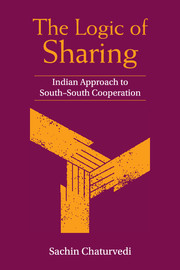Book contents
1 - Genesis and Evolution
from Section I - Policy and Institutional Framework
Published online by Cambridge University Press: 05 March 2016
Summary
Pragmatism is key to the genesis and evolution of Indian development cooperation policy, which reflects the broad principles informing New Delhi's general foreign policy: sovereign equality and a belief in friendly relations with all countries, particularly its neighbouring states. Its guiding principles are a commitment to the promotion of human freedom, opposition to colonialism and the creation of equitable conditions for peaceful and harmonious socio-economic development of all countries. From its inception as an independent state, India has advocated global peace, disarmament and development through various forums that address the problems of developing countries, including the NAM, the G-77 and the G-15. In addition, it has engaged with numerous regional and sub-regional groupings that have been formed in the recent past, motivated largely by trade and investment interests.
As the Indian nationalist leader Mahatma Gandhi said, juxtaposition of peace and prosperity is not a mere contrivance for advocating moral precepts; rather, the two are indissolubly linked. Through various international platforms and at meetings of the UN, India has taken the position that national development across developing countries was an outcome of the efforts of respective national governments but also of the behaviour of the global community in general. This imposes major responsibilities on nations to ensure that their economic processes are guided by a moral purpose and directed towards desirable ends by political will. In regard for internationalism countries should commit to the rapid evolution of a new and equitable economic order under which all nations can live without fear or despair. Against this background, India's international role was well captured by independent India's first Prime Minister, Jawaharlal Nehru, addressing the Constituent Assembly on 15 August 1947:
The service of India means the service of the millions who suffer. It means the ending of poverty and ignorance and diseases and inequality of opportunity … And so we have to labour and to work, and work hard, to give reality to our dreams. Those dreams are for India, but they are also for the world, for, all nations and peoples are too closely knit together today, for any one of them to imagine that it can live apart. Peace has been said to be indivisible, so is prosperity now, and so is disaster in this One World that can no longer be split into isolated fragments.
- Type
- Chapter
- Information
- The Logic of SharingIndian Approach to South–South Cooperation, pp. 3 - 44Publisher: Cambridge University PressPrint publication year: 2015



